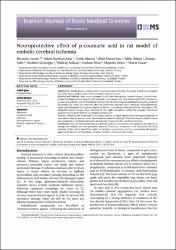Neuroprotective effect of p-coumaric acid in rat model of embolic cerebral ischemia

Göster/
Erişim
info:eu-repo/semantics/openAccessTarih
2015Yazar
Güven, MustafaAras, Adem Bozkurt
Akman, Tarık
Şen, Halil Murat
Özkan, Adile
Salis, Osman
Şehitoglu, İbrahim
Kalkan, Yıldıray
Şilan, Coşkun
Deniz, Mustafa
Coşar, Murat
Üst veri
Tüm öğe kaydını gösterKünye
Guven, M., Aras, A. B., Akman, T., Sen, H. M., Ozkan, A., Salis, O., Sehitoglu, I., Kalkan, Y., Silan, C., Deniz, M., & Cosar, M. (2015). Neuroprotective effect of p-coumaric acid in rat model of embolic cerebral ischemia. Iranian journal of basic medical sciences, 18(4), 356–363.Özet
Objective(s): Stroke poses a crucial risk for mortality and morbidity. Our study aimed to investigate the effect of p-coumaric acid on focal cerebral ischemia in rats. Material and Methods: Rats were randomly divided into four groups, namely Group I (control rats), Group II (ischemia rats), Group III (6 hr ischemia + p-coumaric acid rats) and Group IV (24 hr ischemia + p-coumaric acid rats). Cerebral ischemia was induced via intraluminal monofilament occlusion model. in all groups, the brain was removed after the procedure and rats were sacrificed. Malondialdehyde, superoxide dismutase and nuclear respiratory factor-1 were measured in the ischemic hemisphere. the histopathological changes were observed in the right hemisphere within the samples. Functional assessment was performed for neurological deficit scores. Results: Following the treatment, biochemical factors changed significantly. Histopathologically, it was shown that p-coumaric acid decreased the oxidative damage. the neurological deficit scores of p-coumaric acid-treated rats were significantly improved after cerebral ischemia. Conclusion: Our results showed that p-coumaric acid is a neuroprotective agent on account of its strong anti-oxidant and anti-apoptotic features. Moreover, p-coumaric acid decreased the focal ischemia. Extra effort should be made to introduce p-coumaric acid as a promising therapeutic agent to be utilized for treatment of human cerebral ischemia in the future.

















